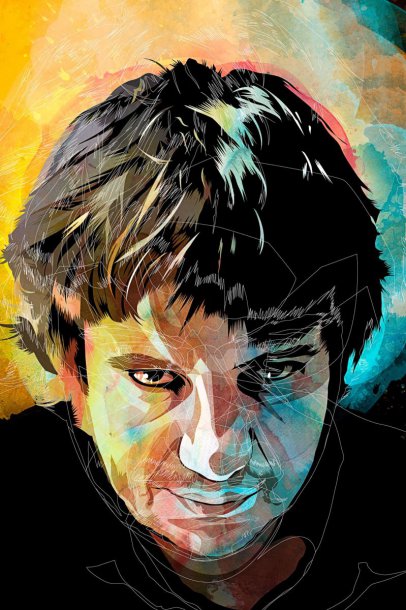"The story of my life": Alejandro Zambra
Published25 Jun 2015

Illustração de ALVARO TAPIA HIDALGO; REFERENCE: ALMA RODRÍGUEZ AYALA / AGENCIA EL UNIVERSAL / AP
Alejandro Zambra (Santiago, 1975) é considerado uma das mais relevantes vozes da actual literatura chilena. Foi convidado do Próximo Futuro, e esteve presente na Festa da Literatura e do Pensamento da América Latina em 2014, ano da primeira tradução em Portugal: Maneiras de Voltar para Casa (Divina Comédia, tradução de Pedro Tamen). James Wood, na revista New Yorker, apresentou recentemente uma leitura crítica da sua obra.
Zambra’s breakthrough occurred with his third novel, “Ways of Going Home” (2011; published here in 2013, in Megan McDowell’s sparkling translation), which seems a different order of achievement from his earlier work. Here, at last, Zambra’s authorial self-consciousness, his reflections on the perils and pleasures of fiction-making, finds a theme that gives it moral gravity and not just formal ingenuity. The novel begins with some of the charm and joyousness of “My Documents.” A nine-year-old boy in a suburb of Santiago witnesses the earthquake of March 3, 1985. He is afraid, but he also enjoys the new excitements on the street—the grownups gathered around a fire, the kids put in tents for the night. The boy notices Claudia, a twelve-year-old girl; a couple of years later, they become friends. Claudia is interesting for several reasons, one of them being that she has an uncle, Raúl, who lives alone: “Raúl was the only person in the neighborhood who lived alone. It was hard for me to understand how someone could live alone. I thought that being alone was a kind of punishment or disease.” Mysteriously, Claudia asks the boy to spy on her uncle, who is rumored to be a Communist: “To me, a Communist was someone who read the newspaper and silently bore the mockery of others—I thought of my grandfather, my father’s father, who was always reading the newspaper. Once I asked him if he read the whole thing, and the old man answered that yes, when it came to the newspaper you had to read it all.” The boy later discovers that Raúl is in fact not Claudia’s uncle but her father, Roberto, a left-wing activist who has been living under a new identity in order to escape the dictatorship’s scrutiny.
In the novel’s second section, the narrator is the writer of the story we have just read in the novel’s first section; and Zambra’s book proceeds like this, the fiction about Claudia and Raúl/Roberto alternating with sections narrated by a man who is writing those very fictions. But what might have been dryly self-involved steadily opens out into Chilean history and political reality. This man, this writer, is trying to come to a reckoning with recent political events, and with the knowledge that his parents were politically quietist (and possibly right-leaning) during the Pinochet years. He has searing memories from his childhood. When he was thirteen, he became aware for the first time that his schoolmates included the children of murdered and tortured parents, and of murderers, too. One day, when he was sixteen, the police chased some thieves into the school’s parking lot and fired shots. The class’s history teacher started crying and hid under the table. “He slowly managed to calm down as we explained to him that no, the military had not taken over again. . . . Of course I knew, we all knew; he had been tortured and his cousin was taken prisoner and disappeared.” The teacher asks the boy about his parents, and the boy replies that during the Pinochet years they “kept to the sidelines.” The teacher seems to look at the boy with curiosity and disdain.
O artigo completo em Story of My Life: The fictions of Alejandro Zambra
